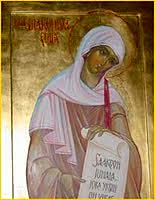Readings:
Ezekiel 2:1-7
Psalm 40:4-10
Romans 16:1–7
Luke 22:24-27Preface of Apostles and Ordinations
PRAYER (traditional language)
Eternal God, who didst raise up Phoebe as a deacon in thy church and minister of thy Gospel; Grant unto us the same grace, that aided by her prayers and example, we too may take the Gospel unto the ends of the earth; through Jesus Christ thy Son our Lord who liveth and reigneth with thee,
in the unity of the Holy Ghost, one God, for ever and ever. Amen.
PRAYER (contemporary language)
Eternal God, who raised up Phoebe as a deacon in your church and minister of your Gospel; Grant us that same grace that, assisted by her prayers and example, we too may take the Gospel to the ends of the earth; through Jesus Christ your Son our Lord who lives and reigns with you, in the unity of the Holy Spirit, one God, for ever and ever. Amen.
Lessons revised at General Convnetion 2024.
Return to Lectionary Home Page
Webmaster: Charles Wohlers
Last updated: 8 July 2024
PHOEBE
DEACON, 25 OCT. NT
 Phoebe (the name means "bright" or "radiant": Apollo and Diana, the god and goddess of the sun and moon respectively, were often referred to as "Phoebos" and "Phoebe"), was a DIAKONOS of the Church at Chenchreae, the eastern seaport of the city of Corinth. (Corinth was on a narrow isthmus that connected southern Greece (the Peleponessus) with northern Greece and the mainland of Europe. Attempts had been made to dig a canal through the isthmus in order to shorten shipping routes, but no attempt was successful till modern times. Accordingly many ships were simply dragged out of the water, put on rollers, and moved across the isthmus and into the water on the other side. Naturally, the crew got shore leave. Naturally, Corinth became famous as a port that accommodated sailors with shore leave. (This may account for the fact that Paul has a great deal more to say about sexual matters when writing to the Corinthians than he does in other connections.) When Paul mentions Phoebe, she has left the vicinity of Corinth and is in Rome, so that Paul commends her to the Church there.
Phoebe (the name means "bright" or "radiant": Apollo and Diana, the god and goddess of the sun and moon respectively, were often referred to as "Phoebos" and "Phoebe"), was a DIAKONOS of the Church at Chenchreae, the eastern seaport of the city of Corinth. (Corinth was on a narrow isthmus that connected southern Greece (the Peleponessus) with northern Greece and the mainland of Europe. Attempts had been made to dig a canal through the isthmus in order to shorten shipping routes, but no attempt was successful till modern times. Accordingly many ships were simply dragged out of the water, put on rollers, and moved across the isthmus and into the water on the other side. Naturally, the crew got shore leave. Naturally, Corinth became famous as a port that accommodated sailors with shore leave. (This may account for the fact that Paul has a great deal more to say about sexual matters when writing to the Corinthians than he does in other connections.) When Paul mentions Phoebe, she has left the vicinity of Corinth and is in Rome, so that Paul commends her to the Church there.
There has been some dispute about whether Paul means to say that she was a "deacon" in the Church (holding the same office held later by Athanasius in Alexandria and Lawrence in Rome), or whether he refers to another office, that of the "deaconess," not the same as a female deacon (but in that event, one would have expected a feminine form of the word), or whether he is simply using the word in a non-technical sense to mean someone known for her helpfulness and service to the Church. He calls her a DIAKONOS, a word which the KJV translates as "deacon" three times (Philippians 1:1, 1 Timothy 3:8,12), as "servant" seven times (including the reference to Phoebe) and as "minister" twenty times (including references to Paul himself). It is a word that originally had the meaning in secular Greek of "someone who is responsible for, attends to, ministers to, or waits on a person or group of persons or a task or area of responsibility." Later, it came to be used in a technical sense to denote a certain office in the church. One has to guess from the context whether it is being used in the technical sense or in the older, descriptive sense. A similar problem sometimes arises with ANGELOS, which is Greek for "messenger, bringer of news." The form EUANGELOS means "bringer of good news," and gives rise to our word "evangelist." When mysterious beings gave messages to men from God, and then disappeared, they were called "messengers of God," or simply "messengers," and so ANGELOS came to mean sometimes "messenger" and sometimes "angel." Sometimes the context does not make it clear which is meant. Again, the Greek MARTYROS means "witness," but came to refer to the particular kind of witness who says, "Jesus is Lord," when he faces death for saying it. Hence, MARTYROS is sometimes to be translated "witness" and sometimes "martyr." Similarly, EPISCOPOS can mean "overseer" or "bishop," and PRESBYTEROS can mean "older person" or "presbyter, priest."
Phoebe was in any event a person of consequence in a congregation near Corinth, someone who had made a valuable contribution there.
by James Kiefer